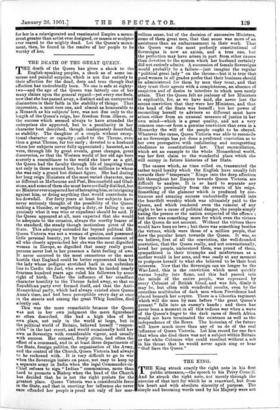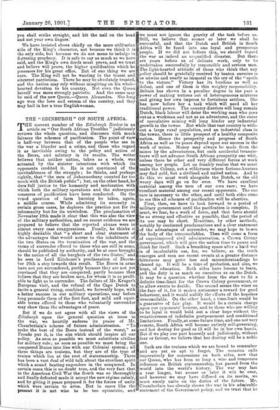THE KING. T HE King struck exactly the right note in
his first public utterance,—the speech to his Privy Council. And he struck the right note, not merely through the exercise of that tact for which he is renowned, but from his heart and with absolute sincerity of purpose. The simple and becoming words used by his Majesty were not said because they were the right thing to say, but because he believed them and meant them. "1 need hardly say," declared the King, "that my constant endeavour will be always to walk in her footsteps. In undertaking the heavy load which now devolves upon me, I am fully determined to be a constitutional Sovereign in the strictest sense of the word, and as long as there is breath in my body to work for the good and amelioration of my people.' These were words worthy of a King called to reign among English-speaking men and the free nations of the Empire, and they were well supported by the further expression of his trust that Parliament and the nation would support him in the arduous duties "which now devolve upon me by inheritance, and to which I am determined to devote my whole strength during the remainder of my life." If this speech shows, as we believe it does, the inspiration of the King to a high sense of his duties and responsibilities, and a true understanding of the need for walking in the path so nobly trod by his mother, the new reign opens with the highest promise. The King may be sure that though the people of this country will doubtless show in the future, as they have shown in the past, an attitude of free and vigilant watch- fulness and criticism towards the Crown, as towards all other institutions, their hearts are with him in his high endeavour, and that a true, if reasoning, loyalty will always he with him to support him in his work for the nation He will not get the lip-service that is so lightly given by, or enforced from, the subjects of his brother-Kings, but he will find that what they may be apt to regard as the surly frankness of the British people is the most solid foundation upon which any earthly throne can rest. Those who are proud to say that they do not fear the King, and are as free to speak their minds and live their own lives as the citizens of the freest Republic on earth, would prove in time of need the boldest upholders of a Monarchy which is to them no product of restraint or external force, but the creation of their own laws,—the cherished outcome of the national will.
What are the qualifications which the King brings to his arduous task ? We are most anxious, and at this time of all others, not to indulge in anything which may appear as the language of conventional flattery or of servile adulation. The moment is one too solemn, and the issues too momentous, for exaggeration. He would be a false friend of the Crown and of the people who would speak nothing but smooth words to the King, encourage the notion that the Sovereign's burden is a light one, or pretend that whatever he may do or say will seem right in the people's eyes. As to the past, however, we believe that the nation will not and ought not to think. Their attention must be fixed on the King that is and will be, and not on the Prince of Wales. The King will be judged, and ought to be judged, solely by his life and actions as King. And that judgment must be just and generous, and hold always in remembrance how gossip and slander and irresponsible talk gather round the occupant of the throne, and how difficult, nay, impossible, for a Sovereign to protect himself from light and frivolous or even malicious tongues. The King must trust the people and they must trust him. When, then, the inevitable reaction comes from the present outburst of warm feeling, the people must not forget that Kings are as mortal as subjects, and far more liable to be mis- represented and misunderstood. At the same time, the King must never forget that his life is now consecrated to the national service, and that what may be pardoned in a Prince cannot be condoned in a Sovereign. The very fact that the past will be utterly banished and forgotten imposes an obligation of honour on the King. The first quality that the King brings to the fulfilling of his great functions as a constitutional Sovereign is courage, moral and physical. Like all his race, he is a man of stout heart, and we may be sure that he will not in public affairs quail or encourage timorous counsels in his Ministers. Next, he possesses a very remarkable knowledge of public affairs. He is oe all political questions, both at home and abroad, extremely well informed, and we doubt if there is any man alive who understands ordinary English public opinion better than he does. As Prince of Wales he had opportunities for studying its nature which are withheld from the reign, and we do not doubt that the lessons thus- hus learnt learnt will stand him in good stead. Beyond this know- ledge he has the instinctive gift of tact,—the power to do and say the right thing at the right moment, and to look forward and prevent the occurrence of unnecessary friction and annoyance. If the history of the last twenty or thirty years could be fully told, it would be found that on countless occasions a timely warning from the Prince of Wales prevented the occurrence of those perplexing and. disagreeable situations and incidents which arise from the neglect of tactfulness. Next, the King is an excellent judge of men. As regards the publie men with whom he has come in contact he has shown this quality again and. again, and his advice in regard to appointments has often proved most useful. One reason for this is that he knows the English world remarkably well, and he has always made a point of keeping himself informed about the record and qualifications of persons who have either attained eminence, or are likely to attain it. If a name were chosen at random from among the men of mark in the nation, it is safe to say that the King would be more likely to know something of him and his qualifications than almost any other person who can be named not specially related to the man in question, —ie., not belonging to his profession or knowing him personally. Again, the King has a ripe memory and a great faculty for putting men at their ease. Hence in all personal negotiations he has proved himself a con- ciliatory force. By universal consent a better chairman of a committee is not to be found in the three kingdoms. He has shown ability to keep to the business in hand without coercing the minority, wounding the feelings of the garrulous, or preventing the expression of helpful as opposed to obstructive criticism.
But these qualities are exactly those which are most useful in a constitutional King. The Queen has fixed once and for ever the position and functions of the Sovereign in our crowned Republic, and great and important and splendid those functions are. The Queen, to use a metaphor, made herself the Permanent Under-Secretary to the nation. She was the power behind the Prime Minister which never changed. She, for the country as a whole, played the part that the Permanent Under- Secretary of State does in a Department. To compare great things with small, she was able to exercise on her Ministers that influence, only of course in a far greater degree, which the most experienced and respected of permanent officials exercise on Cabinet Ministers. She helped her Ministers with advice and counsel. She did not veto their acts or refuse their advice, but she insisted that their advice, and so their acts, should be clear and definite, and that, in fact, they should realise what they were doing. If they told her that a particular course of action was necessary, she of course assented to it, even if she did not personally agree with it, but she insisted that it should not be taken blindfold, but in the full light. Again, if men were proposed for certain great posts, she was able to make her Ministers justify their appointments, and unless we are greatly mistaken, it often happened that the suggested appointments could not stand this negative criticism. The Queen, that is, often proved that she knew more about the person designated for the office than did her advisers. Again, in the matter of foreign affairs the Queen was often able to prevent " fumbling," or" sloppy" action. She could not prevent and did not want to prevent her Ministers taking up deliberately a particular policy for which they were prepared to take the responsi- bility, but she would not allow them, if she could help it, to blunder unconsciously into a policy which they did not really mean, or only half meant. Now in our view the King will be able to carry on this most essential work of criticising his Ministers with success, for he has just the abilities which are required. He is a man of the world, he has judgment, tact, and common-sense, he has a great knowledge of men, and he hates blundering and muddling. Hence we may expect from him that tactful vigilance which is needed however able may be the King's Ministers, and however much they may be devoted to their duties. No action on the great scale is the worse for criticism when it is criticism of the kind which is not obstructive, but which merely demands justi- fication on its own lines,—which says, in fact : I do not forbid you to strike, but I do insist that if you do strike, you shall strike straight, and hit the nail on the head and not your own fingers.'
We have insisted above chiefly on the more utilitarian side of the Ring's character, not because we think it is the only side, but because we do not mean to indulge in flattering prophecy. It is safe to say as much as we have said, and the King's own deeds must prove, and we trust and believe will prove, the higher qualification which he possesses for his great office. But of one thing we are sure. The King will not be wanting in the truest and sincerest patriotism. There he may be absolutely trusted, and the nation may rely without misgiving on his whole- hearted devotion to his country. Not even the Queen herself was more strongly patriotic. And the same may be said of the new Queen,—Queen Alexandra. She long ago won the love and esteem of the country, and they may hail in her a true Englishwoman.




















































 Previous page
Previous page